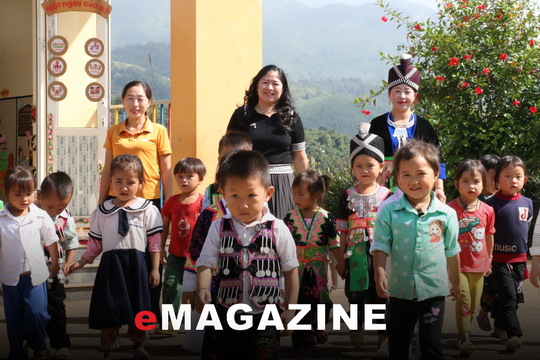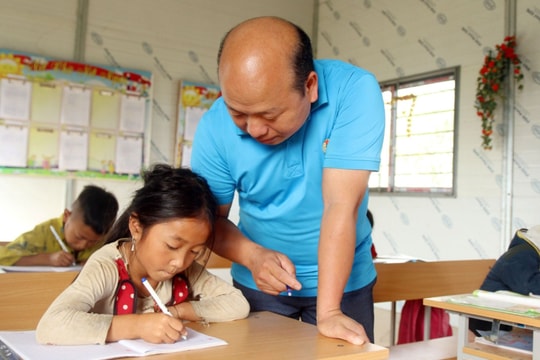Stick to school in difficult areas…
(Baonghean) - Because of the distance, for teachers in the plains and cities, weekends are a time to rest, but for teachers in remote areas, weekends are a time to worry about improving each meal.
A few months ago, we had the opportunity to visit Huu Khuong commune, one of the most disadvantaged communes in Tuong Duong district. It took about 2 hours to travel by waterway from the upstream ferry terminal at Ve village (Yen Na). Teacher Bui Van Hao - Principal of Huu Khuong Primary School warmly welcomed us like we were old relatives. He said: "It's been a long time since a distant guest visited Huu Khuong. How precious!"
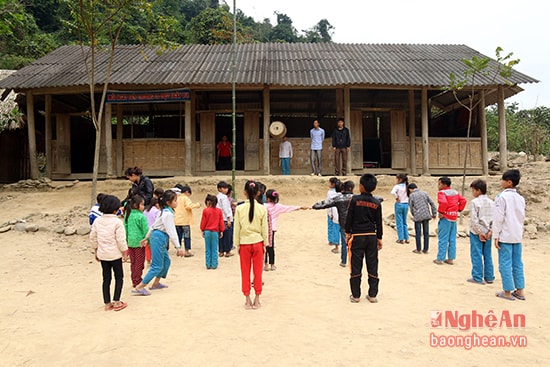 |
| Huu Khuong Primary School, Pung Bon village (Tuong Duong). |
That night, we were arranged to rest in the school dormitory. After dinner, the teachers in the dormitory lit candles to work or went to bed early because there was no electricity. All work had to be done while it was still light, which was extremely hard. The next morning, we went down to Con Phen wharf to go to Pung Bon village, following teacher Lo Thi Mui to wait for the boat to get to the village to teach.
Pung Bon School is still simple and temporary. Every year, the teachers' accommodation is renovated by the local people, with 2 people per room, just enough to put a small bed and place things. In the cold season, lesson preparation mainly takes place on the bed, and in the hot season, it is done in the yard. Yet, the 32 students here still diligently go to class every day, carefully writing each letter under the guidance of 3 teachers.
Ms. Lo Thi Mui from Con Cuong district has been teaching here for more than 3 years. She confided: “Both teachers and students have the same difficulties. However, the students here are very hard-working and obedient. That is a great motivation for teachers in remote areas to devote all their heart and soul to teaching the students.”
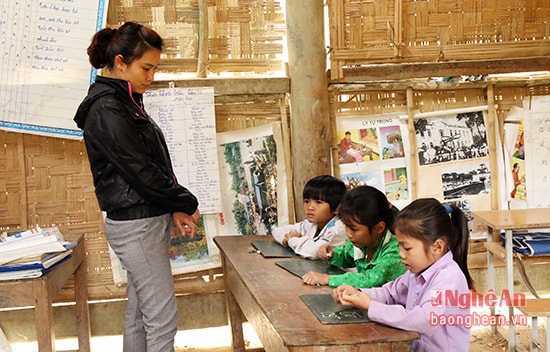 |
| Teacher Lo Thi Mui teaches students at Pung Bon School, Huu Khuong Commune (Tuong Duong). |
Mr. Bui Van Hao - Principal of Huu Khuong Primary School said: "The biggest difficulty for Huu Khuong teachers is the road. In the dry season, it is still bearable, but in the rainy season, they have to stay in the village for a whole month because of rising river water and landslides... Teachers in Pung Bon are already suffering, but in villages like Cha Lang, Tung Hoc, Huoi Pung, it is even more difficult. In Huoi Pung, it takes 20 minutes by boat and nearly 5 km of walking through the forest to get there. Every year, on November 20, the villagers organize a meal to thank the teachers for staying in the village to teach."
I remember the time I entered Na Ngoi 2 Primary School in Huoi Thum village (Ky Son) nearly a year ago. The school had 28 Khmu students, led by two teachers, Mr. Phan Thanh Hoa and Mr. Vu Ba Va. To get to Huoi Thum School, the teachers had to walk for more than an hour. On rainy days, it could take nearly two hours to get there. The road was steep, winding through cliffs and dense forests, extremely difficult, but because of their love for the students, no one complained. The whole school had four classes: 2, 3, 4, and 5, with no class 1. Teacher Phan Thanh Hoa said that this year, there were only four students in class 1, so they could not form a class and had to let the students study at the kindergarten. This school was built with thatch, bamboo, reeds, and leaves. On one side, the two teachers' rooms were as shabby as a shack.
Sitting sipping a cup of water, teacher Phan Thanh Hoa confided: “I came here from Con Cuong district to work for 14 years and have been attached to this school for 2 years. The most difficult thing is still the road to school, the poor economy makes the teachers' lives difficult, lacking in many aspects. Like our school, every year we have to mobilize the villagers to come and re-roof the school so we can teach with peace of mind. Last April and May, a tornado blew away all the roofs.”
Looking into the teacher's hut, we saw a makeshift bed to lie on and a shared desk. It was that simple, after finishing the teaching session, he would go out to find some vegetables to cook. "Every weekend, we send someone to walk to Phu Kha village to buy more eggs and meat to eat for the whole week" - Mr. Hoa added. Then he told us the story of a few days ago when he fell down from Phu Kha and still hurts. The path was only 2 spans wide for an adult, so the wheel slipped and he fell down, luckily he didn't fall into the abyss.
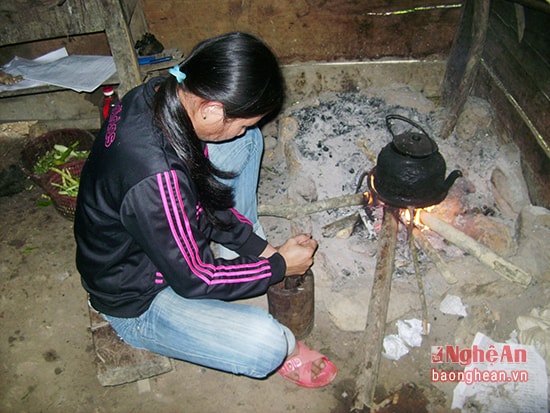 |
| Female teacher in mountainous area makes food from reserve ingredients. |
Because of the distance, for teachers in the plains and cities, weekends are a time to rest, but for teachers in remote areas, weekends have to be spent on improving each meal. Because sometimes teachers in these places can only go home once a month. People's lives are also extremely difficult, food is scarce so everything becomes two or even three times more expensive than in the district center.
During a business trip to Tri Le 4 Primary School, Tri Le Commune (Que Phong), the story of Mr. Lu Minh Phong helped us understand more about the life of teachers in the border area. From Doc Do intersection (Chau Thon Commune, Que Phong District) to Tri Le 4 Primary School is about 17 km, but just one rain is enough to have to stay at school. Only when the matter is extremely urgent will teachers go out, but disaster is always lurking. At the end of 2014, just after a drizzle, because of urgent work, the Vice Principal of Tri Le 4 Primary School on the way, his car slipped down the slope and broke his knee ligament. There were times when the rain lasted for a whole month and he could not return home, so on the weekends, teachers had to go fishing and catching eels to make food for the whole month. Not only that, every rainy season or cold winter, the vegetables grown by the people were damaged, the forest was inaccessible, so green vegetables became extremely rare.
“If I am hungry, I do not have the strength to teach, but I have diabetes and have to limit starchy foods. When there is a lack of vegetables, I have to eat rice to teach. Food here is extremely scarce during the rainy season and winter. The whole school now has more than a dozen teachers with gout and diabetes who need a special diet. But here, many times, we cannot follow the doctor's instructions. The most difficult thing is the medicine. Many times, when it is time to go for a regular check-up to get medicine, the sugar cannot come out, and the diet is not according to the regimen, so the disease gets worse,” said Mr. Phong.
Also in the situation of traffic jam, teachers of Bac Ly 2 Primary School, Bac Ly Commune (Ky Son) also had to take advantage of the weekend to work to increase their own food production. The school launched a campaign for teachers to grow vegetable gardens to increase meals at all the remote locations. Particularly, at the remote locations, teachers took advantage of the weekend to dig ponds to raise fish. The remote locations that do not have ponds, when there is a food shortage, will have fish brought up by other remote locations to "supply".
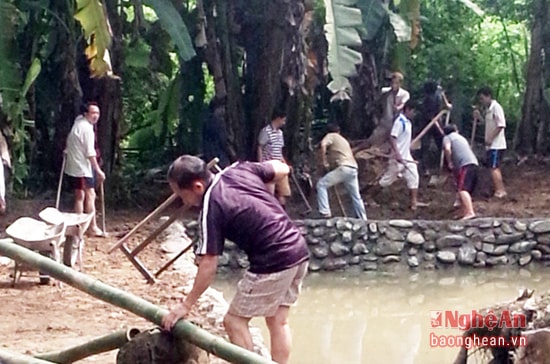 |
| Teachers of Bac Ly 2 Primary School (Ky Son) took advantage of the weekend to focus on reinforcing the fish pond and vegetable garden to ensure food supply when the rainy season comes. |
“In the past, every time the rainy season came, teachers had to prepare several kilos of dried fish and dried bamboo shoots for food. But sometimes eating the same food for a whole month was boring, so it was not healthy enough to teach. Now, every weekend, teachers take turns going home to visit, and some stay to fix the fish pond and vegetable garden to always ensure there is fresh food for when there is a food shortage,” said Mr. Quang Van Khuong, Vice Principal of Bac Ly 2 Primary School.
Not only do they have to worry about ensuring their own food, but the people in these places are also poor, so the meals for boarding students are also very scarce. The amount provided by the Ministry of Education and Training programs for boarding students is still not enough, so teachers here often have to increase their "hunting" for food to increase the meals for boarding students.
“In previous years, there was the SEQAP boarding meal program of the Ministry of Education and Training, but the amount of money was small, so it could not ensure meals for boarding students. In places like this, sometimes the students did not even have enough rice to eat, let alone food. So when they caught fish or eels, the teachers had to share part of it with the students to ensure their boarding meals were more secure. Since 2016, when the SEQAP program ended and there was no new program, we were worried that there would be no more boarding meals, many students would not have enough to eat and drop out of school. So teachers also checked for students from poor families and still had to help them have enough to eat and ensure they went to school regularly,” added Mr. Lang Van Nhan, Principal of Tri Le 4 Primary School.
Dao Tho - Nguyen Hoa
| RELATED NEWS |
|---|

.jpg)
